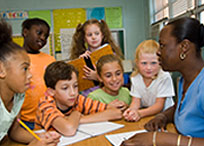
GRADE 3: ENGLISH LANGUAGE ARTS
What my child is learning
In Grade 3, your child learns to understand and communicate about what he or she sees and hears in books, news articles, plays, art, videos, poems and other texts by:
- using different strategies to understand ideas and information
- describing and explaining what he or she understands and comparing ideas and information
- asking questions in order to learn more about topics and ideas
- making and following a plan to find and organize useful information from different sources, such as elders, magazines, stories, information books, and websites
Your child learns to:
- communicate ideas and information to different audiences (who), for different purposes (why), and in different ways (how)
- share his or her work with others to identify strengths and changes for improvement
- check for complete sentences, spelling, and word choice using a variety of strategies (such as reading out loud) and resources (such as dictionaries and classroom charts)
In Grade 3, children learn how to show respect for others and how to help others when working in groups.
To find out more about what your child is learning, talk to the teacher.
You may also refer to the Language Arts Practices: Orientation Guide for information regarding the program's guiding principles and recommended practices.
How your child is assessed
In addition to regular report cards, your child’s classroom teacher also completes a Grade 3 Provincial Assessment ( 1.77 MB) according to criteria set out by the Province of Manitoba. The Grade 3 Provincial Assessment measures reading in English, whereas the Grade 4 assessment evaluates French literacy skills. Teachers collect information about your child’s literacy skills during the first few months of school. Parents typically receive their child’s results along with their first report card of the school year.
1.77 MB) according to criteria set out by the Province of Manitoba. The Grade 3 Provincial Assessment measures reading in English, whereas the Grade 4 assessment evaluates French literacy skills. Teachers collect information about your child’s literacy skills during the first few months of school. Parents typically receive their child’s results along with their first report card of the school year.
This assessment gives you information on your child's ability to read and to understand what he or she has read, as well as to set goals to be a better reader. This information helps teachers plan reading lessons and helps your child build a solid foundation in reading. Please visit the Assessment and Evaluation web page to learn more about provincial assessments.
Your child’s teacher will report on their progress three times a year. Here are the English Language Arts reporting areas and some examples of skills the teacher will assess.
Comprehension strategies (Reading, Listening and Viewing)
- What does your child do to help him or her understand when he or she reads, listens or views?
- How does your child share ideas and ask questions about what he or she has read, viewed, or listened to?
Communication (Writing, Speaking and Representing)
- How does your child use words, images, and different ways of communicating thoughts, ideas, feelings, and experiences?
- How does your child organize ideas for communication (for example, drawing, creating lists, maps, or plans)?
- How does your child use resources to check and improve work?
Critical Thinking:
- How does your child explain his or her thoughts about information, ideas and what others are thinking?
- How does your child use personal experiences, predictions and expectations to think about and evaluate what he or she hears, looks at and reads?
- How does your child discuss similarities and differences, for example between new information and his or her previous knowledge and experiences?
Resources
- Winnipeg Public Library: Features information and programming devoted to Early Literacy as well as access to several databases of digital storybooks for a variety of grade levels.
- CBC has developed a number of educational apps for building children’s vocabulary and introducing them to the joys of reading. The PBSKids website includes a number of Reading Games.
- The International Children's Library is a free collection of digital children’s books from cultures all over the world.
- Oxford Owl for Home: With a free account, parents may access advice and support, educational activities and games, and an extensive eBook library.
- Online Resources for Manitoba Educators: Notified homeschooling families may access this online collection of eBooks, Audio books, eJournals and other resources.
- Please visit the My Learning at Home – English website for links to more English language resources.


